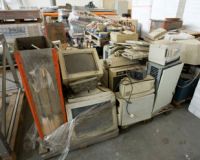

The EU has announced this month that they want to tighten rules on waste electronic and electrical equipment (WEEE). MEPs have proposed new targets for collecting, recycling and reusing waste, and have also recommended tougher measures to prevent the export of e-waste to developing countries, where it can pose a health and environmental hazard.
Karl-Heinz Florenz, a German Parliament member who helped steer the draft legislation through Parliament said, "We can no longer afford to waste our waste. Parliament has sent a strong message that public authorities, manufacturers and consumers all need to play their part to ensure we collect and recycle more of our electrical and electronic goods. We have also set out stricter rules to stop potentially harmful waste being illegally shipped to developing countries."
The EU is proposing targets for Member States to collect 85% of the e-waste they produce from 2016 and 4kg of e-waste per inhabitant, or the weight of e-waste collected in 2010, whichever is greater. MEPs recommended a 50-75% recycling target and a new 5% reuse goal in order to take advantage of reclaiming valuable raw materials. To lighten the administrative burden and costs on companies, MEPs are suggesting a reduction in the number of electrical equipment categories.
Producers of e-goods should pay towards treatment and use eco-design rules to create products that are easier to repair or recycle. In a bid to tackle the illegal export of e-waste, MEPs say stricter inspections of shipments are needed and the exporter should carry the burden of proof that goods are reusable.
The measures still require the approval of the European Council, which is scheduled to debate the issue in March.
For more information, see the: